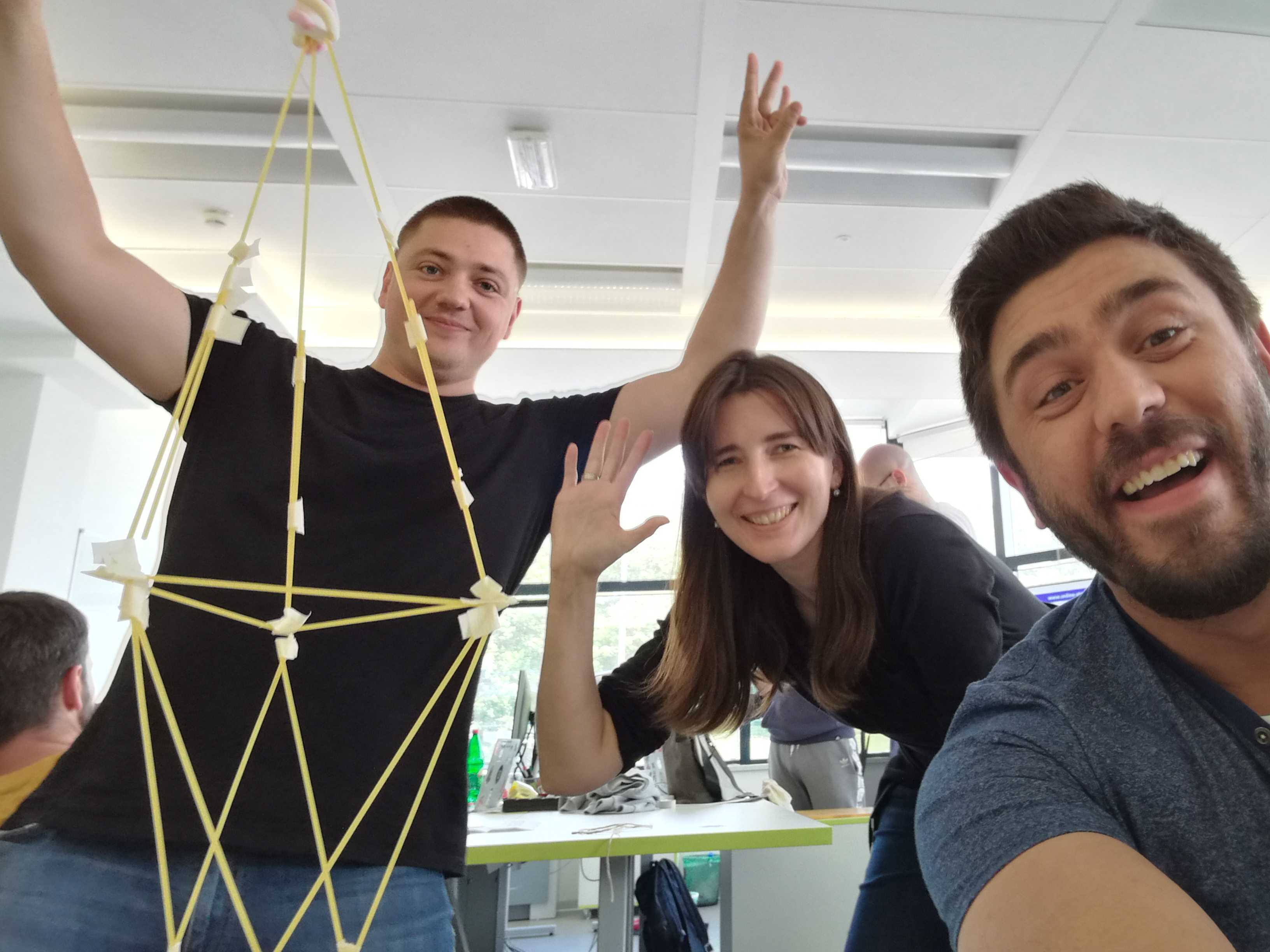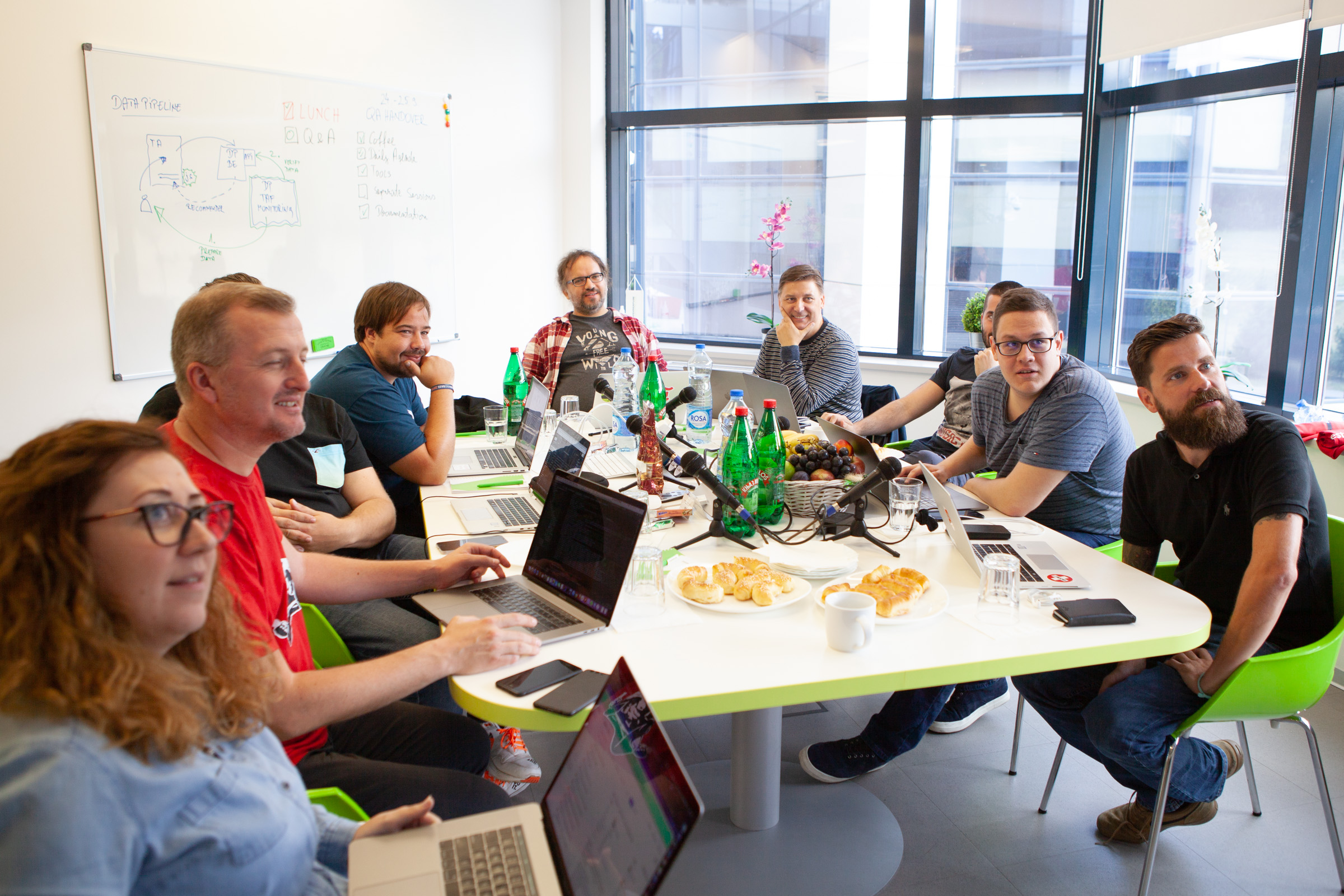Is it possible to create a single team culture in a virtual team?
Posted by InterVenture on November 5, 2020Imagine this: two groups of people compete to make the highest tower possible made entirely out of
- Twenty pieces of uncooked spaghetti
- One yard of transparent tape
- One yard of string and
- One standard-size marshmallow
The only rule? The marshmallow has to go on top.
Now, if you know that one team consists of business school graduates and the other out of kindergartens, who do you think will end up as the victor? The answer might surprise you: it’s the youngsters.
Let’s elaborate on that.
Peter Skillman, a well-known professional in the product design world, created the so-called Marshmallow Challenge which proved that prototyping and multiple iterations lead to success. However, the experiment revealed a lot more about team collaboration and group culture.

Digging deeper into these findings and exploring social studies about different organizational approaches, we couldn’t help but wonder: is it even possible to create a single team culture within virtual teams? How important is it to share physical space with other team members in order to feel a part of something bigger than yourself?
Team culture, as taught by kindergartens
The reasons why kids won the challenge has a lot to do with how humans behave and perceive life at this age.
Playing is an important part of growing up and developing creativity. In contrast to business school graduates, kindergartens didn’t waste time seeking power or overthinking their every move. At this early age, kids have the natural ability to cooperate with others and try different things, especially when they have a shared goal. With such a mindset, each challenge is a game.
The main thing to learn from kindergartens? They don’t fear making mistakes. They simply get right into it because social anxiety is not a factor for them. They are not paralyzed by fear of making a wrong impression on other people in their immediate surroundings.
If you are brave enough to create a culture that encourages experimentation and values ownership, you’re on the right track to create the highest tower yourself, figuratively speaking.

Of course, establishing a team culture in business organizations is a delicate act of balance because team culture shapes group mentality. It sets boundaries and defines what’s desirable and what’s not. Also, it encourages some types of behavior and doesn’t tolerate some other.
There is a popular saying – culture eats strategy for breakfast. We couldn’t agree more.
Team culture has tangible business value
Team culture has proven to be a crucial factor for company success. It can outweigh business strategy in terms of importance. But it’s not just about creating a healthy work environment or maintaining a desirable employer brand that draws talent in and ensures collective progress.
A now-famous Harvard study led by John Kotter and James Heskett has proven that investing in the development of a specific kind of culture that is adaptive at its core, can dramatically influence a company’s bottom line.
The study focused on the difference in results over an eleven-year period between two groups. The first group included twelve companies that reinforced performance-enhancing culture, while the second group included twenty companies without an established culture of this sort. Check the table below for results.
| The average increase for twelve firms with performance-enhancing cultures | The average increase for twenty firms without performance-enhancing cultures | |
| Revenue Growth | 682% | 166% |
| Employment Growth | 282% | 36% |
| Stock Price Growth | 901% | 74% |
| Net Income Growth | 756% | 1% |
(Source: Forbes)
The difference is most visible when looking at the net income growth. Wow, 756%! That’s shocking, isn’t it?
The numbers don’t lie: the right team culture has incredible business value. This value goes beyond the financial aspect and stretches to pushing innovation to the fore, doing meaningful work, enjoying a shared sense of purpose, and making a real impact on the world.
Now imagine if you align team culture and strategy so that they are cohesive and result-oriented? Or better yet: imagine including team culture into your strategy?
Before we dive into the specifics of team culture in virtual teams, let’s take a minute to see what ‘cultural fit’ actually means.
Great team cultures are like business matchmaking
There are many different team cultures and various categorizations, too. According to Benjamin Schneider, strong team culture is marked by endurance and it’s based on the following model:
attraction-selection-attrition
This means people are attracted to organizations that resonate with their values and interests. Likewise, organizations pick people who fit into their existing or envisioned culture. Over time, those who happen to become a part of the organization but alas don’t fit into the team culture – tend to leave. This is how ‘culture becomes a self-reinforcing social pattern’.

Team cultures that prioritize learning and sharing a purpose have proven to be the most responsive to change which is paramount in today’s fast-paced business world. But regardless of the culture style the company leans toward, there are three elements that need to be in place for a strong team culture (so writes Daniel Coyle in his book “Culture Code”):

Safety is about creating a safe and pleasant work environment that recognizes individuality but also aims to create a shared identity that reinforces a sense of belonging.
Vulnerability is about establishing trust, understanding the value and beauty of both collective effort and shared responsibility.
Purpose is about creating and fine-tuning a narrative about shared goals and values.
Team culture doesn’t exist in physical space
Team culture is not something that inhabits office space. It exists within people. It’s about the spoken and unspoken values of one organization, shared attitudes and goals, all the vital things that give team members an unshakeable sense of belonging.
If we touch upon preconceived notions and prejudices, being co-located isn’t a guarantee for success just like having a distributed team isn’t a formula for disaster. In fact, there are a plethora of examples where fully remote companies have a firm, more tangible culture established compared to traditional companies that are tied to an office. Just think about Basecamp, Gong, Buffer, and other renowned brands.
Some might argue that, precisely because remote teams don’t share a physical workspace, they choose to invest an extra effort to create a culture that supports healthy connections.

Instead of perceiving physical separation as an obstacle, true leaders can see it as a condition that follows a truly great opportunity: sourcing talent globally.
With technology, it’s easy to connect in an instant with people who matter. Traces of team culture are omnipresent in every little thing you do – from handling misunderstanding and conflicts and managing business risks to addressing poor performance and celebrating success. It all comes down to the way people are treated and expected to treat others.
The truth is, the stronger your team culture is, the less you have to worry about supervising people. Trust and a shared drive is something that deeply resonates with team members on a tribal level. It’s about creating a ‘we’ that puts everyone on the same page and gets them excited about work. This is why people don’t hate Mondays; it has nothing to do with the location of their work station.
Team culture within virtual teams, from InterVenture’s perspective
Now, if you bear in mind everything we wrote above about the tangible business value of the right team culture and the idea of matchmaking, what argument is there to hinder the possibility of connecting people who aren’t co-located? We don’t see it.
From our perspective at InterVenture, remote work comes with its set of challenges but it’s the right people who make things work. We are very careful when it comes to exploring the possibility of collaboration with our potential partners because that’s where cultural fit has to exist, too.
Simply put, InterVenture acts like a facilitator or a catalyst if you will, that helps the right people find each other. We are the business matchmaker, but that’s not all that we do nor is it enough for long-term success.

The collective efforts of the Talent Management, the Community Team, as well as the Ops Team are what make all the difference.
Talent Managers are responsible for people and their professional development, as well as nurturing a healthy business relationship with the external partner. They lay down the groundwork for mutual growth.
The Community Team is there to facilitate a healthy atmosphere that is not just about tech and IT projects, but recognizes team members beyond their professional roles. Communities are like the glue that keeps people together and induces a strong sense of belonging.
The Ops team works really hard to support people to do their best work and enjoy it, too! They handle the logistics, paperwork, and take care of employee benefits.
Product companies turn to us as they look for specific profiles of talented software engineers who, not only have the desired level of experience and skills but also share similar values and a mindset. Sometimes they need to extend their team, while other times – they are looking for short-term help with a certain project.
Either way, our role is clear and we love it very much: we listen to what our potential partner needs and then match them with a team that represents their other half. We create a win-win situation for everyone involved: talented software engineers have the opportunity to work on projects that excite them while companies benefit from their expertise. That’s how mutual growth works.
Cultural proximity matters just like shared team values do. This is why we believe it’s time to leave the dusty traditional notion of IT outsourcing in the past and embrace a different approach.
If you’re a developer or a software engineer, make sure to check out our community and open job positions.
If you’re a company that needs help with sourcing talent, InterVenture can help! We’ll handle all recruitment, HR, and administrative work to bring A-team players to your ranks and support your growth. Contact us today.